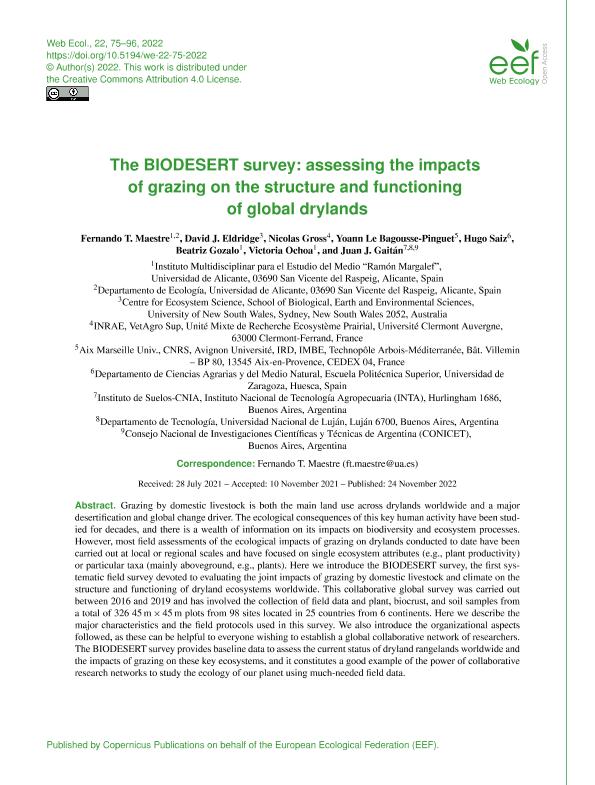Mostrar el registro sencillo del ítem
dc.contributor.author
Maestre, Fernando T.

dc.contributor.author
Eldridge, David J.
dc.contributor.author
Gross, Nicolas
dc.contributor.author
Le Bagousse-Pinguet, Yoann
dc.contributor.author
Saiz, Hugo
dc.contributor.author
Gozalo, Beatriz
dc.contributor.author
Ochoa, Victoria
dc.contributor.author
Gaitán, Juan José

dc.date.available
2023-08-03T14:29:14Z
dc.date.issued
2022-11
dc.identifier.citation
Maestre, Fernando T.; Eldridge, David J.; Gross, Nicolas; Le Bagousse-Pinguet, Yoann; Saiz, Hugo; et al.; The BIODESERT survey: Assessing the impacts of grazing on the structure and functioning of global drylands; Copernicus Publications; Web Ecology; 22; 2; 11-2022; 75-96
dc.identifier.uri
http://hdl.handle.net/11336/206828
dc.description.abstract
Grazing by domestic livestock is both the main land use across drylands worldwide and a major desertification and global change driver. The ecological consequences of this key human activity have been studied for decades, and there is a wealth of information on its impacts on biodiversity and ecosystem processes. However, most field assessments of the ecological impacts of grazing on drylands conducted to date have been carried out at local or regional scales and have focused on single ecosystem attributes (e.g., plant productivity) or particular taxa (mainly aboveground, e.g., plants). Here we introduce the BIODESERT survey, the first systematic field survey devoted to evaluating the joint impacts of grazing by domestic livestock and climate on the structure and functioning of dryland ecosystems worldwide. This collaborative global survey was carried out between 2016 and 2019 and has involved the collection of field data and plant, biocrust, and soil samples from a total of 326 45ĝ€¯mĝ€¯×ĝ€¯45ĝ€¯m plots from 98 sites located in 25 countries from 6 continents. Here we describe the major characteristics and the field protocols used in this survey. We also introduce the organizational aspects followed, as these can be helpful to everyone wishing to establish a global collaborative network of researchers. The BIODESERT survey provides baseline data to assess the current status of dryland rangelands worldwide and the impacts of grazing on these key ecosystems, and it constitutes a good example of the power of collaborative research networks to study the ecology of our planet using much-needed field data.
dc.format
application/pdf
dc.language.iso
eng
dc.publisher
Copernicus Publications

dc.rights
info:eu-repo/semantics/openAccess
dc.rights.uri
https://creativecommons.org/licenses/by/2.5/ar/
dc.subject
Drylands
dc.subject
Survey
dc.subject
Grazing
dc.subject.classification
Ecología

dc.subject.classification
Ciencias Biológicas

dc.subject.classification
CIENCIAS NATURALES Y EXACTAS

dc.title
The BIODESERT survey: Assessing the impacts of grazing on the structure and functioning of global drylands
dc.type
info:eu-repo/semantics/article
dc.type
info:ar-repo/semantics/artículo
dc.type
info:eu-repo/semantics/publishedVersion
dc.date.updated
2023-08-02T10:50:46Z
dc.identifier.eissn
1399-1183
dc.journal.volume
22
dc.journal.number
2
dc.journal.pagination
75-96
dc.journal.pais
Alemania

dc.description.fil
Fil: Maestre, Fernando T.. Universidad de Alicante; España
dc.description.fil
Fil: Eldridge, David J.. University of New South Wales; Australia
dc.description.fil
Fil: Gross, Nicolas. Université Clermont Auvergne; Francia
dc.description.fil
Fil: Le Bagousse-Pinguet, Yoann. Centre National de la Recherche Scientifique; Francia. Institut Méditerranéen de Biodiversité Et D'ecologie Marine Et Continentale; Francia
dc.description.fil
Fil: Saiz, Hugo. Universidad de Zaragoza; España
dc.description.fil
Fil: Gozalo, Beatriz. Universidad de Alicante; España
dc.description.fil
Fil: Ochoa, Victoria. Universidad de Alicante; España
dc.description.fil
Fil: Gaitán, Juan José. Consejo Nacional de Investigaciones Científicas y Técnicas; Argentina. Instituto Nacional de Tecnología Agropecuaria. Centro de Investigación de Recursos Naturales. Instituto de Suelos; Argentina. Universidad Nacional de Luján; Argentina
dc.journal.title
Web Ecology
dc.relation.alternativeid
info:eu-repo/semantics/altIdentifier/url/https://we.copernicus.org/articles/22/75/2022/
dc.relation.alternativeid
info:eu-repo/semantics/altIdentifier/doi/http://dx.doi.org/10.5194/we-22-75-2022
Archivos asociados
